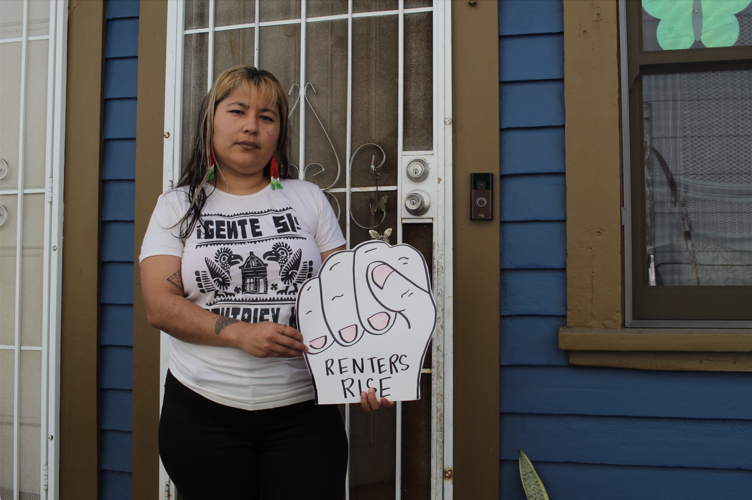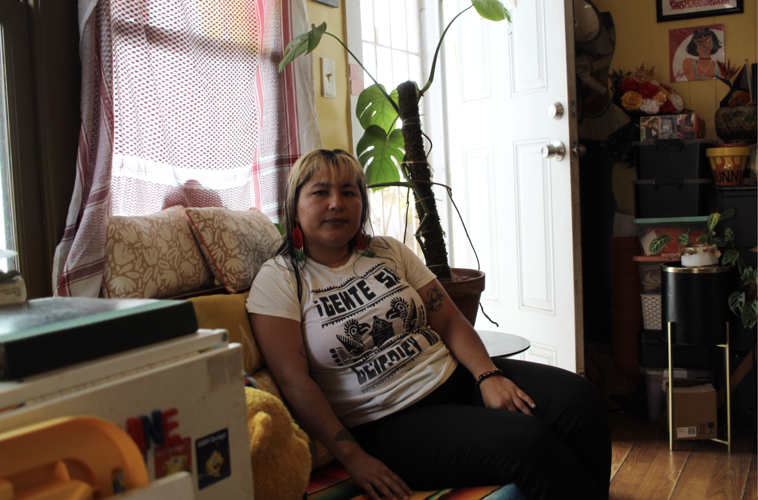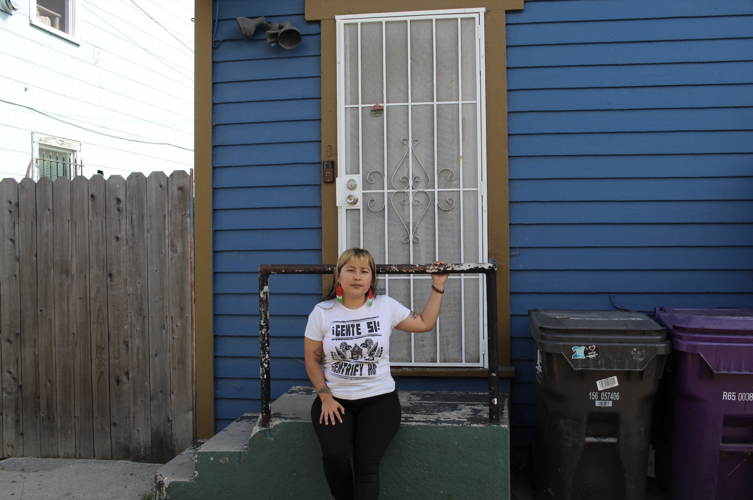
Maria Lopez holds a fist-shaped sign that says "renters rise" in front of her Long Beach home. (Image credit: Michelle Zacarias)
Long Beach residents and housing rights advocates are urging elected officials to eliminate substantial remodel evictions. Community members believe the removal of the “eviction loophole” will help preserve affordable housing for tenants while also encouraging the development of alternative systems to address necessary housing repairs.
Long Beach resident and community organizer Maria Lopez is at risk of being displaced from the home she has been in for 28 years. The house she has lived in since 1997 is one of several connected single-family homes tucked within a residential area. “This neighborhood has seen me grow up,” she told CALÓ News.
Lopez is one of many Long Beach residents fighting against the continued displacement of working-class communities of color. Housing Rights coalitions have taken the issue to the city council, as they predict evictions will accelerate with the 2028 Olympics taking place in Los Angeles. However, many advocates believe the financial and political influences on elected officials hinder further action on the issue, noting that council members have previously received donations from developers and landlords.
In California, property owners must abide by rent control laws that cap annual rent increases for existing tenants. Long Beach landlords, however, are allowed to reset rents to market rates once a unit is vacated. Community members are claiming that this policy creates an incentive for landlords to evict tenants under the guise of “renovations” to boost profits.
Just recently, the Los Angeles City Council voted to temporarily ban eviction notices issued for substantial renovations, effectively curbing the displacement of tenants from rent-controlled units under the guise of remodeling.
Council members determined that the clause was “a significant driver of evictions in the City and contributes to housing insecurity and homelessness.” The decision is intended to protect renters while city leaders weigh a long-term solution.
Now, organizations like the Long Beach Tenant Union (LBTU) are calling on the Long Beach City Council to follow suit and remove the "remodel loophole," which is contributing to the displacement of locals.
Lopez is a first-generation graduate from Cal State Long Beach and has organized with the LBTU since its inception. For many years, Lopez lived in a home owned by a private landlord who was very involved with tenants and the community. The building was sold in August 2023 after her landlord passed away from cancer, and by October 2023 Lopez, along with several other tenants, received their first 60-day notice to vacate for substantial remodeling.
This marked the beginning of a lengthy legal battle for Lopez, during which many of her longtime neighbors moved away. “I had two neighbors—whose children I basically grew up with—who are no longer part of the property,” she said. “They were here for forty years.”

Maria Lopez sits inside of the home she has lived in since 1997. (Image credit: Michelle Zacarias)
Along with overall rent increases, many of the elderly, working-class and immigrant families that resided in Lopez’s building were forced out. She said that once the community started to dissipate, the harassment from her landlord intensified.
“I started to feel really unsafe here in my home,” said Lopez, citing an instance when her landlord entered her unit without prior notice while she was showering. “I called the police, and the police did nothing.”
By March 2024, Lopez had received a second notice to vacate for the same reason, which she successfully contested in court, where the judge sided with Lopez, declaring the notice unlawful.
Shortly thereafter, the property owner began issuing a series of 24-hour entry notices under the pretense of inspections and repairs. Many of these notices, Lopez notes, seemed excessive and retaliatory.
After contesting multiple previous remodel notices, Lopez says her landlord changed strategies in January of 2025, including switching legal counsel and ordering the issuance of a three-day pay or quit notice on January 7. Lopez attempted to pay the rent in person, accompanied by four witnesses but the landlord was not present to accept the payment.
“My rent did not get accepted, and he did not check his cameras… he did not communicate with me or talk to his workers” she explains to CALÓ News, “and just began suing me.”
Lopez is now facing trial on April 21 for “non-payment of rent,” despite attempting to fulfill the payment obligation. She suggests this may be part of a broader tactic by landlords to use the just cause policies as a means of eviction.

Maria Lopez, Long Beach resident, is at risk of losing her housing (Image credit: Michelle Zacarias).
Maya Iyyani, a housing attorney and Long Beach resident, told CALÓ News that landlords across California have a history of abusing renovation provisions to justify evictions. “Tenants living in below-market-rate units are more likely to receive substantial remodel notices, especially after being given some type of illegal rent increase that doesn't need to be followed," she states. Iyyani described the practice as a long-standing tactic used to raise rents or retaliate against renters who assert their rights.
The push for stronger tenant protections in Long Beach has spanned over several years. In 2021, the City Council directed the City Manager to explore ways to permit renovation work in rental units without displacing tenants permanently. By December 7 of that year, the City Manager returned with a series of proposals, including one modeled after Los Angeles’s Tenant Habitability Program that would have effectively ended so-called “substantial remodel” evictions.
As the ordinance currently stands, there is limited recourse for tenants to stop landlords from exploiting provisions related to renovations. According to Iyyani, many renters feel pressured to comply with remodeling notices, even when they may be legally entitled to stay.
“From my experience as an attorney, even though tenants have rights, they often leave because they’re scared,” she said. Iyyani explains that many working-class renters fear the long-term consequences of an eviction judgment, which can remain on a person’s record for seven years.
Locals, like Lopez, who have built their lives in Long Beach, now have the highest risk of being forced out. “If we don't stop substantial remodel evictions, we are leading ourselves into further displacement and gentrification,” she states.
The court system can be tedious and costly, especially for working class tenants who do not have the resources or money that developers have. Without intervention from elected officials, Lopez fears that communities will slowly unravel as the displacement of immigrant families and tenants of color accelerates gentrification.
“We are at their mercy,” said Lopez of the residents of Long Beach, urging the city council to act. “Unless substantial remodel ceases to exist from our just cause policy, I may continue to have to fight.”















(0) comments
Welcome to the discussion.
Log In
Keep it Clean. Please avoid obscene, vulgar, lewd, racist or sexually-oriented language.
PLEASE TURN OFF YOUR CAPS LOCK.
Don't Threaten. Threats of harming another person will not be tolerated.
Be Truthful. Don't knowingly lie about anyone or anything.
Be Nice. No racism, sexism or any sort of -ism that is degrading to another person.
Be Proactive. Use the 'Report' link on each comment to let us know of abusive posts.
Share with Us. We'd love to hear eyewitness accounts, the history behind an article.